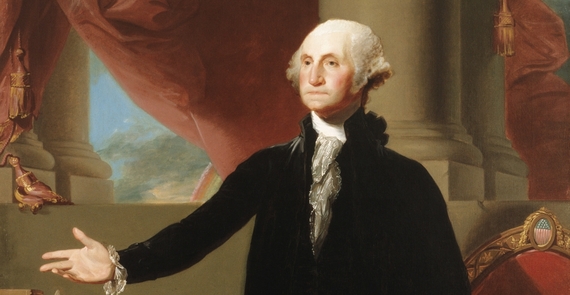We call him the father of our country, but no one ever called him Pops.
He was not that kind of guy, George Washington. He was aloof. Haughty. Vain. Writer Bill Bryson, writing in his delightful book Made in America, reports that he preferred his men call him "Your Excellency."
Washington was neither a back-slapper or back-slappee; he hated being touched by strangers. He could be touched in other, surprising ways. When things didn't go his way -- and they frequently didn't -- Washington was known to weep in public. (During one march through New Jersey, he watched through watery eyes as an army of 30,000 men shrank to 3,400.) By all accounts, the George he defeated in the war, a monarch to the palace born, was a lot more fun to be around than the colonial upstart.
Being a fun guy seems hardly to have occurred to Washington. This austere, regal leader of a bawling, brawling, newly born democracy seemed more intent on being respected rather than popular.
Rules loomed large in his life, so large that at the age of 16, he'd already written a treatise on the rules of social engagement, something called "Rules of Civility and Decent Behaviour in Company and Conversation."
Rule No. 1 in what's come to be known as "George Washington's Rules of Civility" came to dominate his view of life life: "Every Action done in Company ought to be with Some Sign of Respect to those that are Present." This and most of his subsequent (and heavily Capitalized) rules suggest it wasn't mere pompousness or insecurity that prompted his apparent haughtiness -- it was the bedrock of his personality; he was only abiding by rules he'd long before set for himself.
One can only imagine how he'd react to the spectacle of the men and women who would kill to inherit the presidential mantle whose fabric he so fastidiously tried to weave.
His book of commonsensical admonitions is as fresh today as back when, especially, for example, if you've ever had to sit next to someone with ear buds in their ears: "In the Presence of Others," he wrote, "Sing not to yourself with a Humming Noise, nor Drum with your Fingers or Feet."
Even at 16, he had a thing about protecting his personal space, not a bad idea when you remember how dangerous life could be, biologically speaking: "Wry not the mouth and bedew no man's face with your Spittle by approaching too near him when you Speak."
And it wasn't only his famous wooden chompers than kept a smile off his official portraits: "Do not Puff up the Cheeks, Loll not out the tongue, rub the Hands, or beard, thrust out the lips, or bite them or keep the Lips too open or too Closed."
Clearly, anyone who cared as deeply about civility as Washington did couldn't have relished living the politician's life of flesh-pressing, baby-kissing and unbridled bloviation. But he answered his country's call for a war-hero president, a job made no easier by his painful awareness of history's gaze: "There is scarcely any part of my conduct which may not hereafter be drawn into precedent."
I'll leave it to Bryson to summarize this fine figure of a misunderstood and mythologized man:
He genuinely and nobly wanted only what was best for his country. Such was the hysteria that greeted his triumph over the British that he could have had any tribute he cared to ask for -- a kingship, a lavish life pension, his own Blenheim Palace on the Potomac. He asked only to be allowed to a quiet life at Mount Vernon.
Instead, he was elected president. Twice. Unanimously. Bryson writes that he requested Congress not pay him a salary, but only meet his expenses "a position all the more honorable when you consider he was chronically hard up." When he made the trip from Mount Vernon to New York City for his inauguration, he had to borrow 100 pounds to pay his costs.
Washington saw his job as setting the standard for everyone who would follow him, a job he did exceedingly well. If most of his successors and wannabes couldn't and can't measure up to those stirring standards, shame on them, not him.
So raise a glass to the memory of a good and noble man, to the man who set his standards as high as his goals. Raise a glass to George Wshington, the father of his country, the gentle man who wouldn't be king.
